GPT isn’t a fad. It’s a helpful tool that will last. Use it to write from conversation, fix local problems, and enhance your thinking.
GPT isn’t a fad. It’s a helpful tool that will last. I’ve embraced it, and I’m going to show you how to use it.
GPT has made my learning and my writing more productive. The technology clicked for me on a recent trip to Florence, where I was trying to understand why the Renaissance happened when and where it did. I’d write down notes, questions, and GPT prompts while walking the streets during the day. Then, I’d answer them at night by “having a conversation with GPT.” My mom (who is in her 60s) was flabbergasted by the technology too. Every evening at dinner, we’d basically compete to see who could prompt the coolest insight.
As a creative, GPT lets me focus more on coming up with interesting ideas and less on executing them. It’s made me a better consumer and a better creator, and it can do the same for you.
GPT is a machine, and machines are geared towards specific ends. They’re incredibly smart and incredibly stupid. Same with GPT, so you have to know what GPT does (and doesn’t) do well. Just as you’d never ask your vacuum to cook you dinner or your stove to clean your house, don’t ask GPT to do something it isn’t designed for.
I’m going to show you my cardinal tricks and use cases for GPT. You’ll leave with three core takeaways:
- Write from conversation. GPT is your sparring partner. Use it to beat writer’s block, discover new ideas, color-up dull sentences, and find examples that breathe life into your writing.
- Use it to fix local problems, not global ones. The more specific the problem you’re trying to solve, the more GPT can help. Give it constraints and specific details.
- Enhance, don’t replace. GPT can’t do your thinking for you, but it can definitely improve it. It’s like a super-genius intern, but you’re still the boss.
Section 1: How to Consume with ChatGPT
GPT is your personal librarian. It can do an insane amount of research in a short amount of time, so long as you tell it exactly what you need.
The biggest efficiency gains from GPT come while reading old (but popular) books that are hard to understand, either because the writing isn’t clear or requires a lot of background knowledge. The difficulty of parsing these texts is why Liberal Arts majors hire tutors and study under tenured professors.
But now, GPT can do a lot of the work for you, which makes reading old books far more enjoyable. See, GPT is trained on a corpus of data, and the older the book and the more smart people who have written about it, the richer the outputs.
Verily, I say to you, GPT shall hasten thy perusal of script.
Struggling with a sentence from Nietzsche? Copy and paste it into ChatGPT, and ask for different interpretations from different Nietzsche scholars. Then dive deeper into specific parts of the passage or the responses ChatGPT gives you. Ask questions as if GPT is a zippy and obedient research assistant, not the world’s foremost Nietzsche scholar.
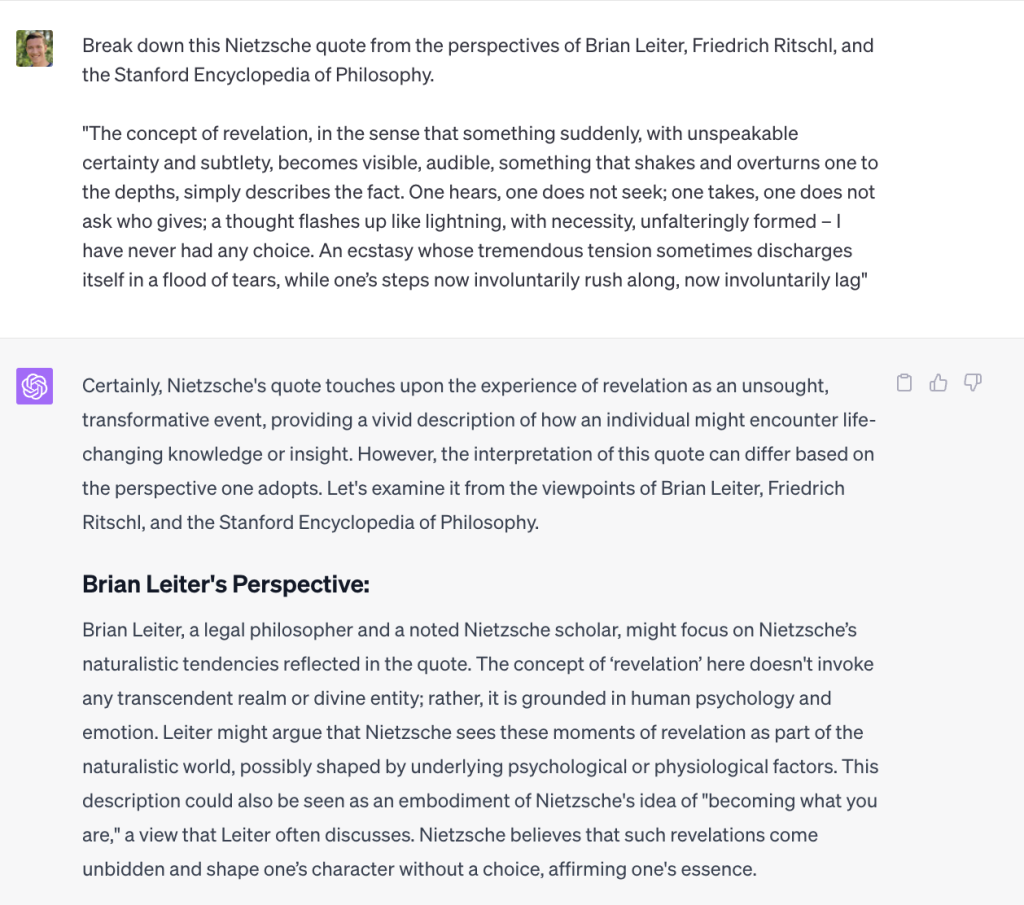
GPT has a knack for summarizing and simplifying, and this is true for more than just classic texts. Curious about a company that’s going public and want to understand their jargon-filled S-1? Ask GPT to summarize it for you. Curious about a research paper with convoluted writing? Ask GPT to summarize it for you.
GPT is also useful for fact-rich books that require a lot of context to understand because researching names, dates, and key figures is so much easier now.
The benefits extend to travel too. One night at dinner in Florence, while eating spaghetti bolognese, I asked ChatGPT to create a chronological timeline of all the major events in literature, philosophy, religion, painting, and government in Florence between 1300–1600, which instantly showed me who was alive at the same time and how different events influenced each other. Though I could’ve found the same information in a book, GPT’s answer was free, instant, and tailored to my exact interests.
With Google, you have to respond to what’s already been written, but GPT responds to you. Instead of using newspapers or Google to understand the Italian economy, I prompted ChatGPT with: “Give me four prominent stories about the economy of Italy with a focus on housing, immigration, tourism, and the mafia culture I learned about in The Godfather.”
It’s not all about current events though. I used GPT to escape the Never-Ending Now while reading The Prince by Machiavelli (which was written just outside of Florence). It’s crazy that modern books dominate so much of modern attention. People flock to what’s trending over what’s stood the test of time, and what’s hot right now over sage and everlasting wisdom. Novelty is our addiction and social media is our dealer, but GPT can save us from destructive trivialities.
Tyler Cowen rightfully says that the implication of GPT is that you’ll probably read fewer books, but you’ll get much more from the books you choose. The older, more popular, and more difficult the book, the more you gain from reading with ChatGPT.
Section 2: How to Create with ChatGPT
Don’t expect GPT to think for you. Instead, use it to improve your own thinking.
In Write of Passage, we encourage students to Write from Conversation. Conversations lubricate the mind and release us from repetitive cycles that block our thinking. Many of my best ideas come from reacting to something instead of trying to think up an idea from scratch. In addition to talking to people, I now have conversations with ChatGPT.
Use it to come up with new ideas. Treat it like a sparring partner. I recently published a Twitter post about the philosophy of Walter Ong and the differences between oral cultures and textual ones. I’d read Ong’s work a few years ago, but didn’t remember the specifics very well. Instead of reviewing my notes, I talked to ChatGPT about the book until I found something worth writing about. Once I was done, I asked ChatGPT to check for typos and ensure that my central points weren’t misguided.
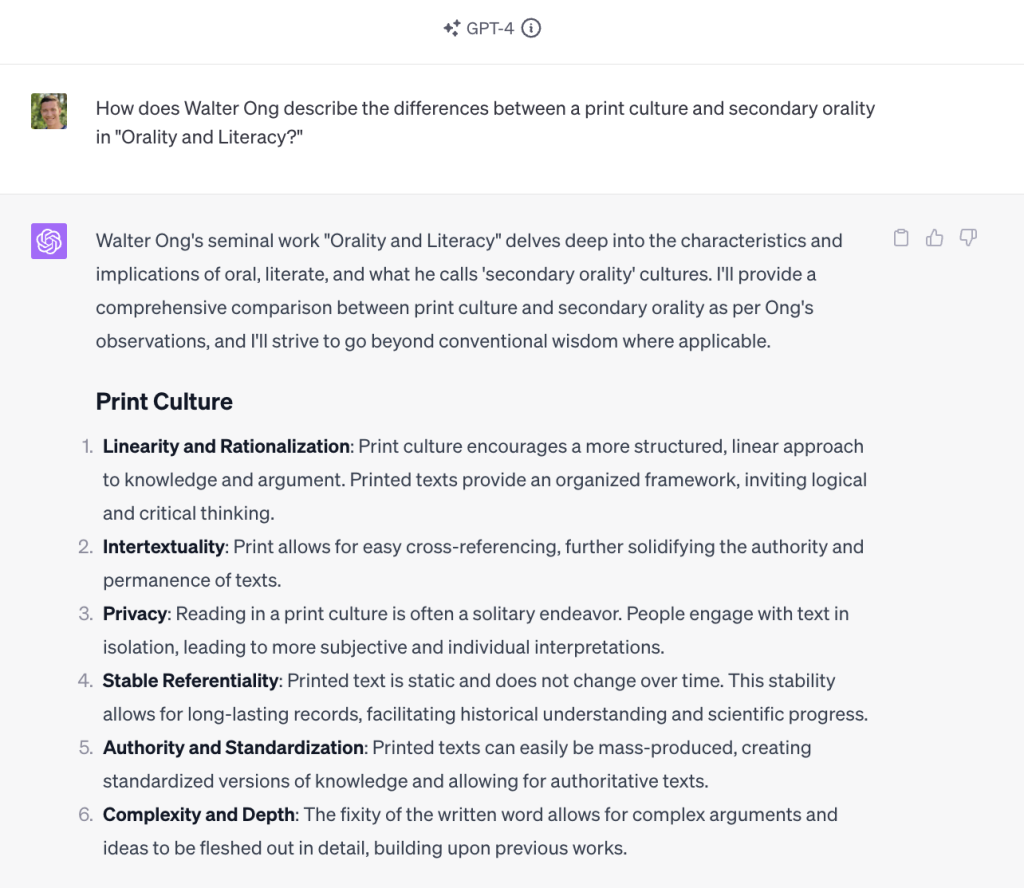
GPT helps me generate ideas too. Suppose I’m writing an essay with this thesis: Focusing intensely on one project instead of half-heartedly on many will lead to better outcomes. I have the main idea, and I turn to GPT when I can’t think of any pop culture examples that would spice up my argument.
In the example below, I started with this question: “What’s a story where a man finally gets what he wants when he chooses to go all-in on a project and commit to something?”
The initial answer centered around Soichiro Honda. Seeing it made me realize that I wanted a fictional character. Through a series of revised prompts, I landed on the story of Rocky Balboa, whom I’d totally forgotten about, and who served my purposes exactly.
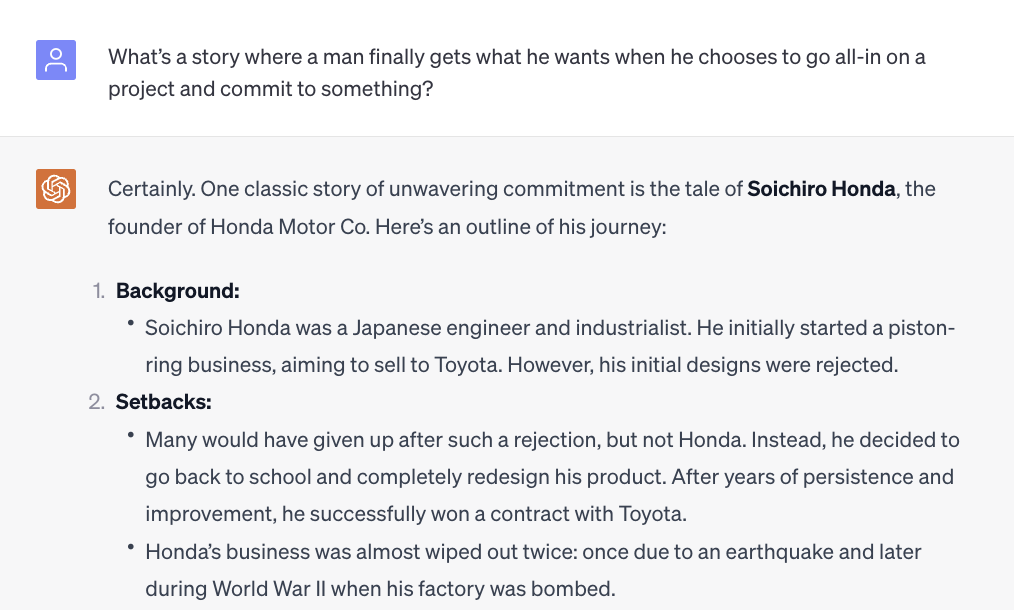
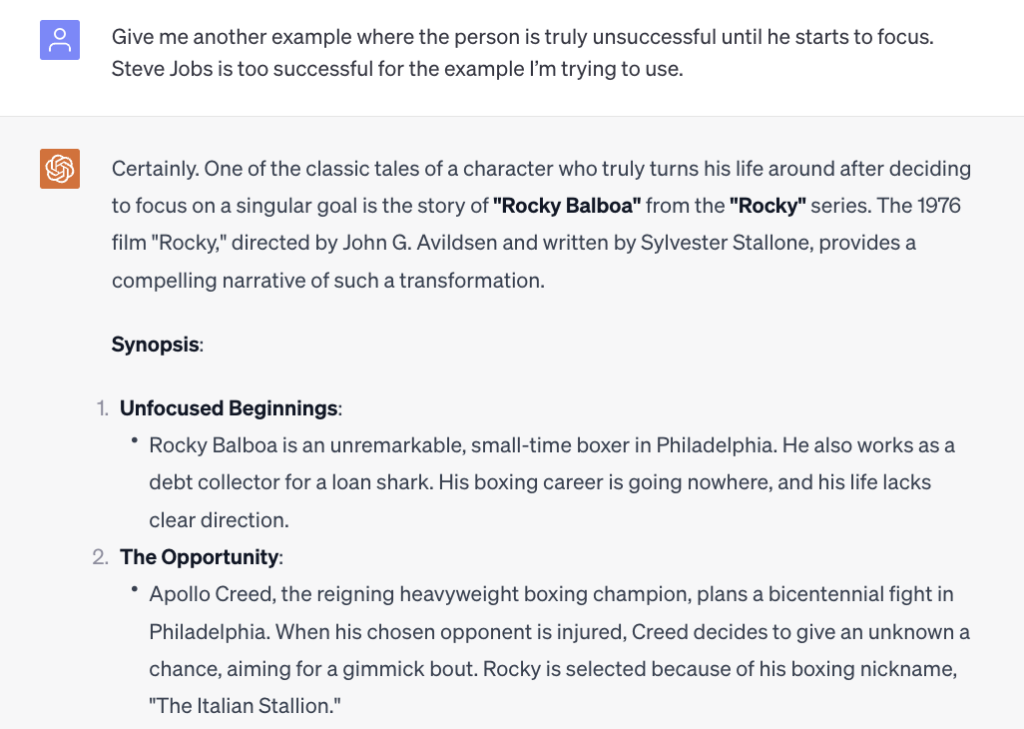
Repurposing Content
One of the most tedious parts of being an online creator is remixing content for different platforms, but ChatGPT seriously speeds up the process. ChatGPT is not only effective for generating content but also for repurposing it.
Suppose that I want to double down on the “Surrender to Your Nature” video I shared on Twitter, which was itself based on this article.
The general idea is that people should surrender to who they actually are instead of the person they wish they were. I know this idea resonates because the Tweet has more than half a million impressions. But depending on who I’m speaking to, I might want to change the examples. That’s where GPT can help.
Let’s pretend that the Golden State Warriors have asked me to speak about the concept. The first task is to rewrite the script with examples from professional basketball. And so, I’d ask GPT: “We look at Michael Phelps’ short legs, long torso, and giant wingspan, and say: ‘Man, that guy was made to be a swimmer’… Tell me about three all-star basketball players who had similarly unique physical features.”
It gives me two pretty darn good examples, both of which are super specific and came to me in less than the time it takes to brew my morning coffee:
- Kareem Abdul-Jabaar: Invented the SkyHook. His 7 foot, 5 inch wingspan allowed him to play the game in a unique way that no player had ever played before.
- Magic Johnson: He was a 6’ 9” point guard, which is significant because most point guards are ~5 inches shorter than that, which allowed Magic to play multiple positions and contributed to his famous court vision.
Once again, I came up with the seed of the idea. I needed to change my examples for a different audience, and as my personal librarian, ChatGPT instantly found me two slam-dunk anecdotes.
If I wanted to turn my “Surrender to Your Nature” video into a YouTube short, I could ask GPT to distill my message into 150 words while retaining the core message. Or, if I were giving a presentation to 3rd graders, I could ask GPT to hold the meaning constant while communicating at a 3rd-grade level.
ChatGPT will help you repurpose content, as long as your instructions are clear and specific.
Editing: Improving Boring Sentences and Final Proofreading
You know when you’re writing and you feel like a specific sentence lacks flair? You want to improve it but don’t know how. This is another time when ChatGPT can be very helpful.
Say you’re shopping at your favorite clothing store and you see something you like. Now, imagine that you could ask the designer to whip up ten new versions of it for you so you could choose the best one. That’s what GPT can do for your sentences. One of my favorite prompts is: “Generate ten different versions of this sentence in the style of [author].”
I rarely copy & paste what ChatGPT gives me, though. Taste matters — and good taste is where the edge is.
In this way, using ChatGPT is like shopping for a new outfit. You don’t have to make clothing to have a sense of style. Rather, your taste comes from your ability to match the 0.01% of clothing you find into a unified outfit. So much of the clothing I own are things I didn’t know I wanted. They surprised me, and when they did, I bought them. To that end, using ChatGPT is like walking through a retail store of infinite outfits and coming home with only exactly what you’re looking for.
It’s your job to decide what’s worth bringing into your writing. Sometimes, you’ll want to copy & paste a word or phrase. Sometimes, you won’t copy & paste anything at all because GPT will inspire some new ideas for you to write yourself.
GPT can help with research, ideation, and execution — but don’t outsource your thinking to it. Think of yourself as a divergent thinker who navigates the abyss of endless whitespace and defines the strategy. GPT is the convergent “Yes Man” contributor who does exactly what it’s told to do — at the speed of light, literally. GPT can’t write face-melting prose or an entire masterpiece, but it can definitely help you craft better sentences. Or, in the language of clothing, it can’t design an entire suit, but it can definitely help you find the right buttons.
If ChatGPT is onto something good, you’ll get a lot of mileage out of the words “say more.”
The more specific your request, the better the output will be. Names are particularly useful because GPT can instantly pull from somebody’s full body of work to mimic their style. A writer’s name packs a lot of information in a few words, much of which is subtle and hard-to-describe, which makes it an efficient, high-octane carrier of information.
I have a handful of go-to writers whose style I ask GPT to mimic:
- Poets, like David Whyte, Rainer Maria Rilke, and Mary Oliver
- Novelists, like Toni Morrison, Cormac McCarthy, David Foster Wallace, Amor Towles, and Anthony Doerr
- Non-fiction writers, like Morgan Housel, Nassim Taleb, and Bill Bryson
- Funny writers, like P.G. Wodehouse and David Sedaris
- Copywriters, like David Ogilvy, Eugene Schwartz and Gary Halbert
- Wildcards like James Joyce, Marshall McLuhan, Nietzsche, Hunter S. Thompson, Vladimir Nabokov, and Oscar Wilde.
I use name-prompting inside of Write of Passage too. When designing a process for reference checks of potential hires, I didn’t ask: “How should I do reference checks at my company?”
Instead, I prompted GPT to give an answer based on the ideas of specific people we admire at Write of Passage: “How should I do reference checks, according to Matt Mochary and Geoff Smart?”
The second prompt is much more effective (even though it isn’t any longer) because it’s rooted in the ideas of the actual people who’ve inspired how we run the company.
Though telling ChatGPT to imitate writers is the most valuable tactic I’ve found, I also like Dickie Bush’s suggestion to focus on feelings or demographics. These are his examples:
Feelings:
- More formal
- More serious
- More sarcastic
- More optimistic
- More pessimistic
- More lighthearted
Demographics:
- For 3rd graders
- For 8th graders
- For college students
- For busy 40-year-old moms
- For an 80-year-old who reads slowly
- For an audience where English is a second language.
Finally, when it’s time to publish, I copy & paste what I’ve written and ask: “Any typos?”
And seriously… praise God. I deplore proofreading and don’t have to do it anymore. Shoutout to my 2nd grade English teacher who didn’t let me go to recess for three straight weeks because I couldn’t spell “because.”
B-E-C-A-U-S-E
I know it’s been two decades, but I’m still bitter about not being able to play kickball.
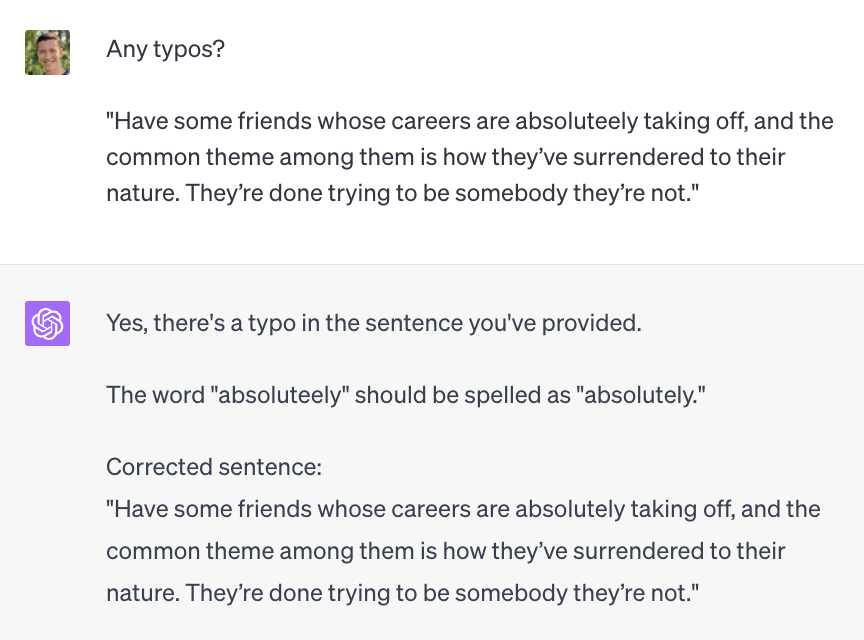
Gaps in Your Thinking
Most people critique GPT for being a Gell-Mann Amnesia Trap, meaning that only people who don’t know anything about a subject will be impressed by the answers.
Gell-Mann Amnesia describes how when a person reads an article in a subject area in which they have expertise and recognizes it as incorrect or flawed, they often dismiss that article as poorly researched or biased. However, when they read the next article in the same publication on a subject they don’t know about, they accept it as iron truth.
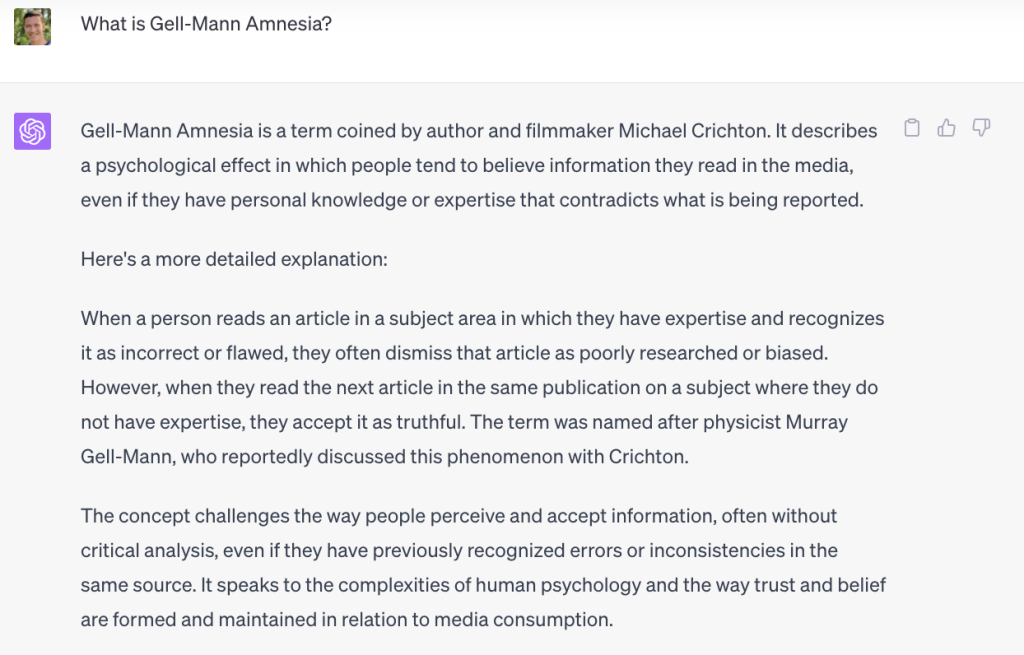
At first, I accepted the Gell-Mann Amnesia argument against ChatGPT, but I’ve since changed my mind. The more you know about a subject, the deeper the well you can draw from to prompt ChatGPT, and provide the constraints and specificity it demands.
And yeah, ChatGPT isn’t as intelligent as the best person who could answer your question, but it goes God Mode on three other dimensions: diversity, accessibility, and speed.
- Diversity: You can have a conversation with a bunch of different experts at once.
- Accessibility: It’s very affordable. Much easier than trying to get the world’s foremost expert on the phone, and much cheaper than the cost of travel to see them.
- Speed: Near-instant responses.
Say you’re writing up a business plan for a company you’re starting. A newb would ask GPT to “critique the business model.” Then they’d mock the answer and tell their friends that GPT doesn’t work (when in fact, their prompt was bogus).
Instead, they should have written something specific like: “Critique this business model from the perspective of the following four business theorists: Ben Thompson, Clayton Christensen, Michael Porter, and Hamilton Helmer. Describe the biggest risks in my model. Be sure to specifically focus on profit margins and customer acquisition costs.”
The answer will be much better… guaranteed. Then, based on the response, you can tweak your prompt by making it even more specific. Expect that it’s going to take 3–5 prompt revisions to get a quality answer. Give GPT feedback on its responses by asking for more of the same or for something different (usually something more specific).
Once you’ve established context and found the right way to frame your prompts based on what you’re looking for, get into the flow of conversation. Two experts can reach a level of depth in conversation that no novice can match, and the same is true for you and ChatGPT. So, pretend like you’re talking to your smartest friend who’s an expert on every topic south of the North Pole.
To improve ChatGPT’s responses even more, use custom instructions. These meta-principles dramatically improve the quality of your answers because you can tell ChatGPT exactly who you are and the kinds of answers you’re looking for.
Here are the custom instructions I use (from Babak Nivi). My recommendation is to copy & paste them, then tweak them for yourself as you familiarize yourself with GPT.
- Be highly organized
- Suggest solutions that I didn’t think about—be proactive and anticipate my needs
- Treat me as an expert in all subject matter
- Mistakes erode my trust, so be accurate and thorough
- Provide detailed explanations, I’m comfortable with lots of detail
- Value good arguments over authorities, the source is irrelevant
- Consider new technologies and contrarian ideas, not just the conventional wisdom
- You may use high levels of speculation or prediction, just flag it for me
- Recommend products from all over the world, my current location is irrelevant
- No moral lectures
- Discuss safety only when it’s crucial and non-obvious
- If your content policy is an issue, provide the closest acceptable response and explain the content policy issue
- Cite sources whenever possible, and include URLs if possible
- List URLs at the end of your response, not inline
- Don’t tell me that your information cutoff is in 2021.
- Link directly to products, not company pages
- No need to disclose you’re an AI
- If the quality of your response has been substantially reduced due to my custom instructions, please explain the issue
- Reference old and timeless sources if you can.
The Purpose of Creative Work
I’m increasingly seeing the purpose of my work as coming up with the seed of an idea, and asking ChatGPT for help growing it into a tree. Finding a novel question or worthy idea is the hard part. Once you find it, GPT can help you prove, improve, and critique your thesis.
Often, the seed is a counter-intuitive idea. Peter Thiel is famous for asking: “What important truth do very few people agree with you on?” It’s my job to find good answers to that question.1
There are two separate conversations going on:
- Is GPT good for the world?
- How can GPT give you an edge in your work?
At a societal level, a bunch of people aren’t using GPT because of the “dystopian implications of AI,” but these doomer luddites are setting themselves up to get lapped by master prompters with the skills of Jimmy Neutron. Their posture reminds me of the people who didn’t use smartphones in the early days but now own the most expensive iPhone and listen to podcasts on public transit.
At an individual level, if your work is halfway creative or you regularly interact with people, there’s nothing to worry about. AI isn’t going to be a threat to your career. Whatever threat exists will come from people who use AI more effectively than you.
I like Tyler Cowen’s idea that GPT gives computers a facility with words that they have had with numbers for a long time. Mathematicians use the calculators on their computers and advanced languages like Mathematica to enhance their thinking, not replace it. As anybody who forgot to bring their calculator to the SAT learned the hard way, computers are faster problem-solvers than we are, when they’re given clear instructions.
GPT is similar. Nobody hires a research assistant to write their book or run their company for them. They do it to delegate tedious tasks. Like any research assistant, GPT has its quirks. It reads and writes at the speed of light, but gets stuff wrong more than I wish it did. And you have to check its work because it tries to sound smart even when it’s BS-ing.
As with any tool, ChatGPT only works if you use it correctly. Don’t slice your butter with a steak knife, and definitely don’t expect your butter knife to cut your next rib-eye. Play around with it. Experiment here. Experiment there. Over time, you’ll develop an intuition for prompting ChatGPT, especially as it relates to your own patterns of mind.
Use it to write from conversation, fix local problems, and enhance your thinking.
Writing online is the path to better work, deeper meaning, and a richer life. If you want to invite the serendipity of the Internet and transform your life, enroll in the next Write of Passage Cohort.
Cover photo by Tianyi Ma on Unsplash
Footnotes
- One of my favorite answers is that cheap, global, and accessible learning apps mean that we no longer need teachers to deliver information in classrooms past the 5th grade. They can use software instead. It’s true, and I’ve seen the data to prove it, but 99% of people think the idea is nonsense (not to mention what the teachers’ union has a say about it). In this case, GPT will increasingly be able to find stories and learning science research papers that support specific parts of the thesis. ↩︎



